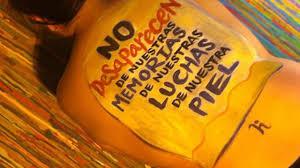
https://www.iss.nl/en/events/state-violence-blind-spot-transitional-just...
Drawing on their recently published books, the speakers will explore how state violence has been systematically overlooked in transitional justice frameworks, perpetuating impunity and exclusion for victims, the organizations they belong to and their families.
Diana Gómez Correal’s De Amor, Vientre y Sangre: Politización de Lazos Familiares y Gestación de una Paz Transformadora en ColombiaOpens external (2024), examines the politicization of relatives of state violence’s victims, focusing on the role of emotions, identity and subjectivity. Through a decolonial and feminist approach, the book critiques the limitations of transitional justice for tackling victims’ rights and claims; and offers a transformative vision of peace rooted in the proposals and lived experiences of affected communities.
Goya Wilson Vásquez’s Learning through Collective Memory Work: Troubling Testimonio in Post-war PeruOpens external (2025), traces the struggles of the HIJXS de Perú collective, the children of the Tupac Amaru Revolutionary Movement (MRTA), as they navigate the stigma of being labeled 'children of terrorists' and reclaim a space in a post-war society. The book theorizes memory work through a cycles of inquiry approach, placing alongside three movements: a realist testimonio, a politics of memory, and a poetics of memory to challenge dominant narratives and explore alternative ways of knowing.
A reflexive and critical approach to research
Methodologically, both authors display embodied and activist research that develop creative methodologies, as well as innovative strategies of writing that challenge traditional notions of knowledge production. Their work exemplifies a reflexive and critical approach to research that bridges activism and academia, offering new possibilities for understanding violence, memory, and transitional justice in Latin America.
Together, in addition to share the methodological approaches, the speakers will address:
- critical questions related with the specificities of state violence
- the blindspots of transitional justice regarding this violence
- the particularities of the category of 'victim' in this context
- the contributions of the organizations of victims and relatives in rethinking justice and society in both countries
Speakers
- Diana Gómez Correal has a PhD in Anthropology from the University of North Carolina, Chapel Hill. She was the first vice-minister for women in the Ministry of Equality and Equity in Colombia, and has also worked as an associate professor, researcher and public servant.
Her research interests include transitional justice, memory, gender and feminist studies, social movements, decoloniality and post-development. Gómez Correal has been involved with women's, feminists, peace, victims' and generational movements in Colombia.
- Goya Wilson Vásquez has a PhD in Education from the University of Bristol. Born in Peru, she grew up in Nicaragua and now lives in the United Kingdom where she works on memory struggles and creative/radical methodologies from Latin America by examining the dilemmas of writing violence, the intersections between research and activism and the uses of creativity/imagination in memory work.
- The conversation will be moderated by Silke Heumann.









